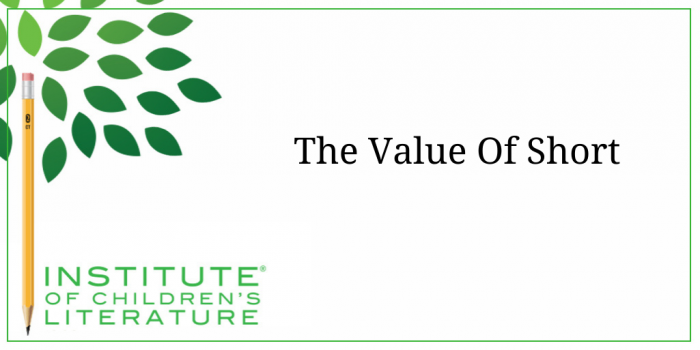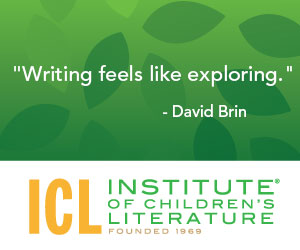1000 N. West Street #1200, Wilmington, DE 19801
© 2024 Direct Learning Systems, Inc. All rights reserved.

For the last few weeks, I’ve been reading short stories. I’ve always loved short stories but they especially suit my ability to focus at present. And reading all these short stories is reminding me of how wonderful this form really is. I primarily write novels or chapter books, but I’ve been feeling the pull of the short story. It was the first format in which I ever wrote fiction for publication.

In a short form, you have very little time to construct your plot and tell your story. In this, it shares the challenge of picture book writing. I think the main difference between short stories and picture books is that short stories are a kind of miniaturized novel, while picture books are a kind of expanded poetry (whether in verse or not). Short stories aren’t constructed word by word the way picture books are (though that level of attention to your craft while writing a short story won’t hurt the end product at all). And picture books aren’t quite as connected to plot elements as short stories are. But the tight word count constraint of short stories is challenging and causes many writers to throw up their hands and say, “I just can’t write short stories.” Or “I’m just not a short story writer.” So why would anyone want to put themselves through the hard work of trying to tell a story short?
One of the positives of short story writing is the opportunity to experiment with a new plot type or a new genre or a new approach or a new voice without the massive commitment of a novel. Now, of course, writing exercises can offer that same opportunity, but I’ll admit to being mercenary enough to prefer to do my experimenting in a way that could, maybe end in something I can sell to a publisher or use as an example to show to a publisher. For those of us who aren’t as happy when we’re doing writing that we’ll never show anyone else, a short story can give us an opportunity to learn and grow while producing something marketable.
Well, I generally don’t write voice heavy long fiction. I find it exhausting to maintain a specific unique voice for a long work, but I love writing that way in shorter forms. I love the theatrical nature of putting on a very different sort of voice. A strong narrator voice can pull in a reader as long as the writer handles the voice deftly, which is hard. So a short story is a great place to stretch your voice muscles. And the more you stretch and strengthen your voice skills, the better you’ll be able to use them in a novel later.

What sort of new technique have you thought about but it sounded hard? If you normally write everything in first person, have you considered trying a short story in third person or even second? One of the short stories I read this week was written in second person (where the main character is actually called you). A story in second person might start: “You didn’t expect your first third grade field trip to include a flat tire, a rampaging elephant, and a new best friend, but field trips are learning experiences, aren’t they?” Second person is an unusual choice, but fun to play with and a short story can be a great place for that kind of play. Second person can begin to sound forced in a long form, but in a short form it’s fun and engaging.

Finally, a short story can also be a good place to play with a different verb tense. In children’s literature (in fact, in most literature), stories are normally written in past tense. Young adult fiction (and some middle grade novels) have played a bit with first person, present tense books, but present tense is very difficult to maintain simply because it’s so unusual. We’ve wired our brains so see narrative fiction as past tense, so your brain will keep trying to switch it back to past tense. If you’re interested in trying present tense writing, a short story is a good place to do the work of rewriting your storytelling brain. You can get a feel for all the things it changes when you write in present tense.
Writing short is more challenging than writing long. You can’t be as self-indulgent. You often have to carefully weigh every element of the story and toss out those that don’t serve the story in more than one way. For instance, suppose you have a line that is funny and you love it, but does it also do one other thing? Maybe revealing something about the character? Or giving us a hint that will matter more later? Or moving the plot along? If it doesn’t do two jobs, it might not be worth the valuable real estate it holds in your tight word count demands.

Many new short story writers give big hunks of information in the narration to feed the reader all the stuff the writer knows about the character and the character’s history but doesn’t have room for. Much of that we simply do not need to know. We don’t need to know why a child is afraid of the dark in a story. It’s okay for that simply to be true. If the story occupies a few hours spent with the main character and his best friend, we won’t need to know about the parents, siblings, school life, etc. unless it directly impacts the moments of the story. In fact, unless the story simply doesn’t make sense without all that stuff, leave it out. That alone will do wonders for your word count.
Right now, I’m feeling a strong urge to return to short stories for a while. A part of me feels as if my writing is getting a bit too much in a rut. It tends to sound the same. It’s still selling. Editors still say nice things. But I’m not experimenting, I’m going with the sure thing every time. And writing isn’t only about doing what works. It’s about being brave. It’s about learning and growing. It’s about exploring. So whenever I feel like I’m not taking enough chances, not learning enough new techniques that aren’t a comfortable part of my writing toolbox, and not exploring in new dark places, I feel the pull of the short story.
And to be honest, it’s a nice option when longer forms are simply requiring too much focus. Focus isn’t my best thing at the moment. So crafting a short story plot while trying a little something new has two pluses for me right now. It allows me to acknowledge my present weakness while still pulling me in a direction of growth. And that is truly appealing.
How about you? Are you reading to get short with me? You’ll be glad you did.
With over 100 books in publication, Jan Fields writes both chapter books for children and mystery novels for adults. She’s also known for a variety of experiences teaching writing, from one session SCBWI events to lengthier Highlights Foundation workshops to these blog posts for the Institute of Children’s Literature. As a former ICL instructor, Jan enjoys equipping writers for success in whatever way she can.
1000 N. West Street #1200, Wilmington, DE 19801
© 2024 Direct Learning Systems, Inc. All rights reserved.
1000 N. West Street #1200, Wilmington, DE 19801
© 2024 Direct Learning Systems, Inc. All rights reserved.
1000 N. West Street #1200, Wilmington, DE 19801
© 2024 Direct Learning Systems, Inc. All rights reserved.
1000 N. West Street #1200, Wilmington, DE 19801
© 2024 Direct Learning Systems, Inc. All rights reserved.

1000 N. West Street #1200, Wilmington, DE 19801
© 2025 Direct Learning Systems, Inc. All rights reserved.

1000 N. West Street #1200, Wilmington, DE 19801
©2025 Direct Learning Systems, Inc. All rights reserved. Privacy Policy.
2 Comments